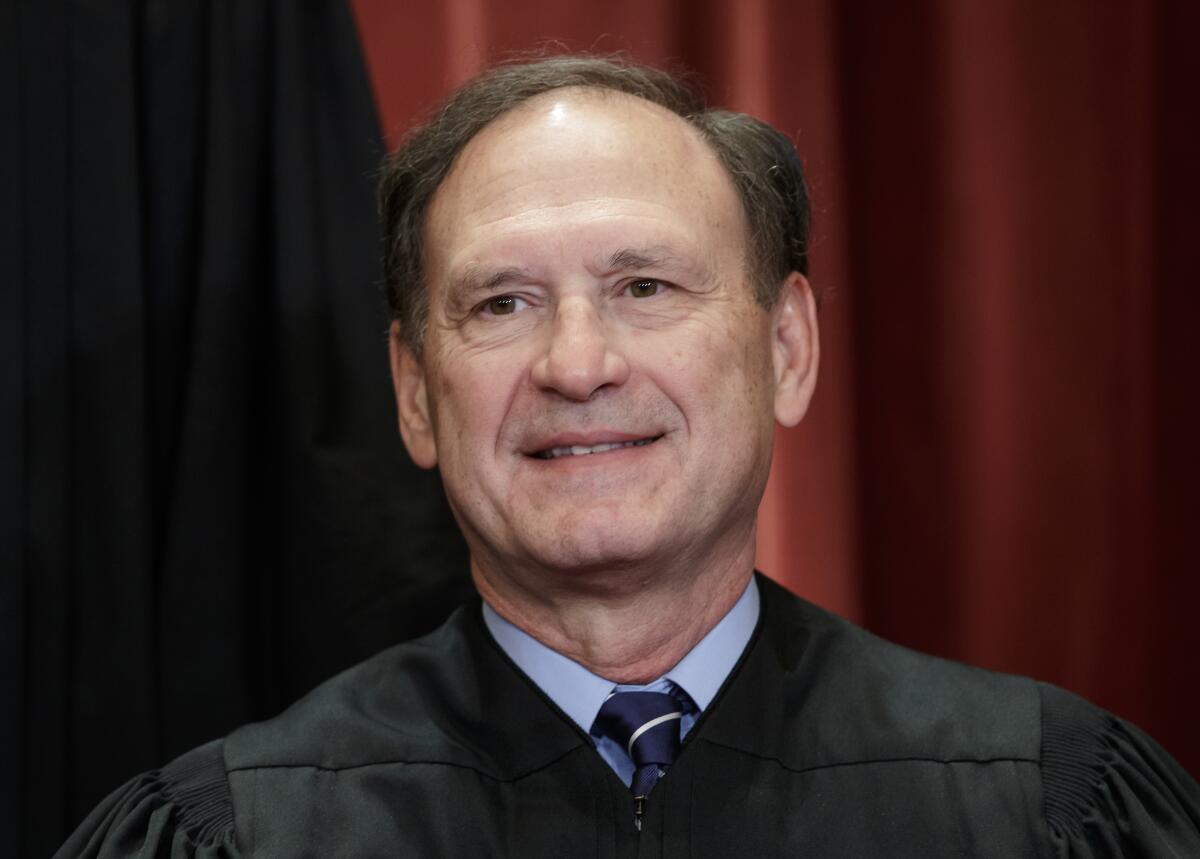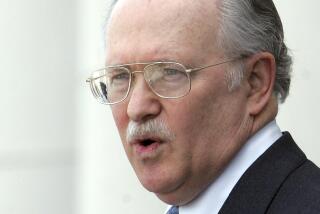Op-Ed: There’s nothing wrong with Justice Alito telling the world his views

Amy Coney Barrett repeatedly told the Senate Judiciary Committee at her confirmation hearings in October that she could not answer any question that even touched remotely on matters that could come before her as a justice because that would indicate a prejudgment on the case. Most people accepted her refusal as part of the script.
Yet, in a stunning speech to the Federalist Society on Thursday, Justice Samuel A. Alito Jr. stated his views on many matters that are pending or will soon be before the Supreme Court. His candor should forever end the pretense by judicial nominees that they are merely neutral umpires calling balls and strikes as well as their claim that it is inappropriate to share their views.
Alito clearly offended the norm of judges not taking a public position on issues before their courts, but he violated no rules of judicial conduct because none exist for Supreme Court justices. Nor was anyone surprised by the positions he expressed. In his 15 years on the Supreme Court, he has been unfailingly very conservative.
In his speech, he condemned state restrictions on attendance at religious services during the COVID-19 pandemic as an assault on religious freedom. On Thursday, the Roman Catholic Diocese of Brooklyn filed an emergency request asking the justices to grant it relief from attendance limits at church services ordered by New York Gov. Andrew Cuomo. Alito’s words leave no doubt as to how he will rule on this and on other challenges to closure orders to stop the spread of the coronavirus.
The justice’s speech focused on how “religious liberty is fast becoming a disfavored right.” He stressed that business owners should be able to claim the right of religious freedom in refusing to fill prescriptions for contraceptives or in discriminating against gay and lesbian couples.
Just a week earlier, the court heard oral arguments in a case about whether the City of Philadelphia infringed on religious freedom by prohibiting private social service agencies that screen potential foster care parents from discriminating based on race, sex, religion or sexual orientation. Catholic Social Services claims a constitutional right to discriminate against gay and lesbian couples. Alito’s speech made clear how he will vote.
Several cases are pending before the court involving florists, videographers, stationery stores and others who refuse to serve same-sex weddings. Alito could not have been more direct in saying how he will rule in cases involving discrimination based on religious views.
There is a case now pending before the court on whether the Food and Drug Administration can require a woman who wants a medication abortion to pick up the drug in person at a clinic. A federal district court ordered the FDA to relax that rule during the pandemic. Alito indicated that he will side with the FDA. And he expressed in his speech that there should be much more protection of gun rights, a matter sure to reach court again soon.
Should we be troubled by his explicitly telling us his views on so many issues?
The conventional view is that judges either don’t have opinions or their positions don’t matter in how they will vote on cases. That is nonsense. Of course, jurists have ideologies and opinions, which matter enormously and often determine the outcome. President Trump and the Republican Senate rushed through the confirmation of Barrett precisely because they want someone with very conservative views on the court.
It does not help to pretend that judges are umpires and their ideologies are irrelevant in how they decide cases. Perpetuating that myth creates a very misleading image of the law and the legal system. Moreover, that pretense gives judicial nominees an excuse for refusing to disclose their views, even when they will make all the difference in their decisions.
I disagree with Alito on every issue he spoke about, but I don’t think he did anything wrong in telling us his views. I was surprised, though, by his aggrieved tone, which presented conservatives as victims. There are now six conservative justices and he likely will be in the majority on every one of the issues he discussed.
Maybe that was the point of the speech: He was announcing to the world that he knows he has the votes on the Supreme Court to achieve his agenda and is committing to moving it forward. We are used to hearing agendas from political candidates, not judges. But we may be better off hearing him confirm his ideological biases rather than pretending otherwise.
Erwin Chemerinsky is dean of the UC Berkeley School of Law and a contributing writer to Opinion.
More to Read
A cure for the common opinion
Get thought-provoking perspectives with our weekly newsletter.
You may occasionally receive promotional content from the Los Angeles Times.






